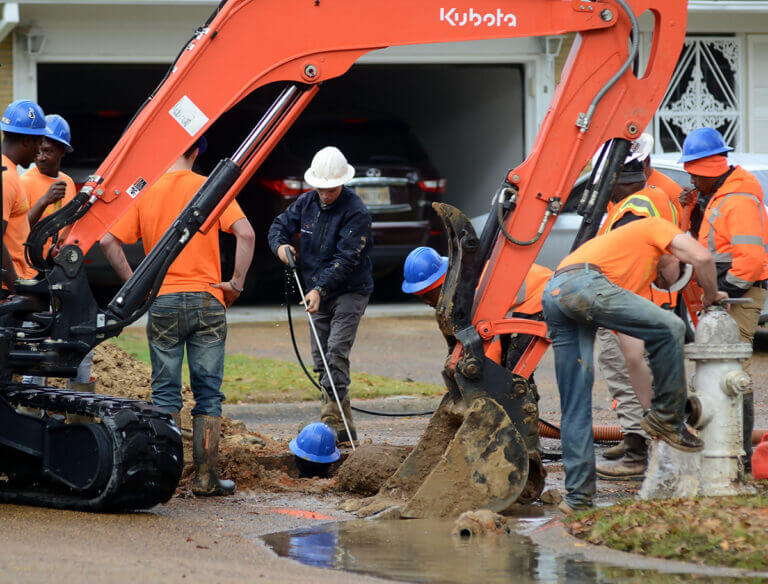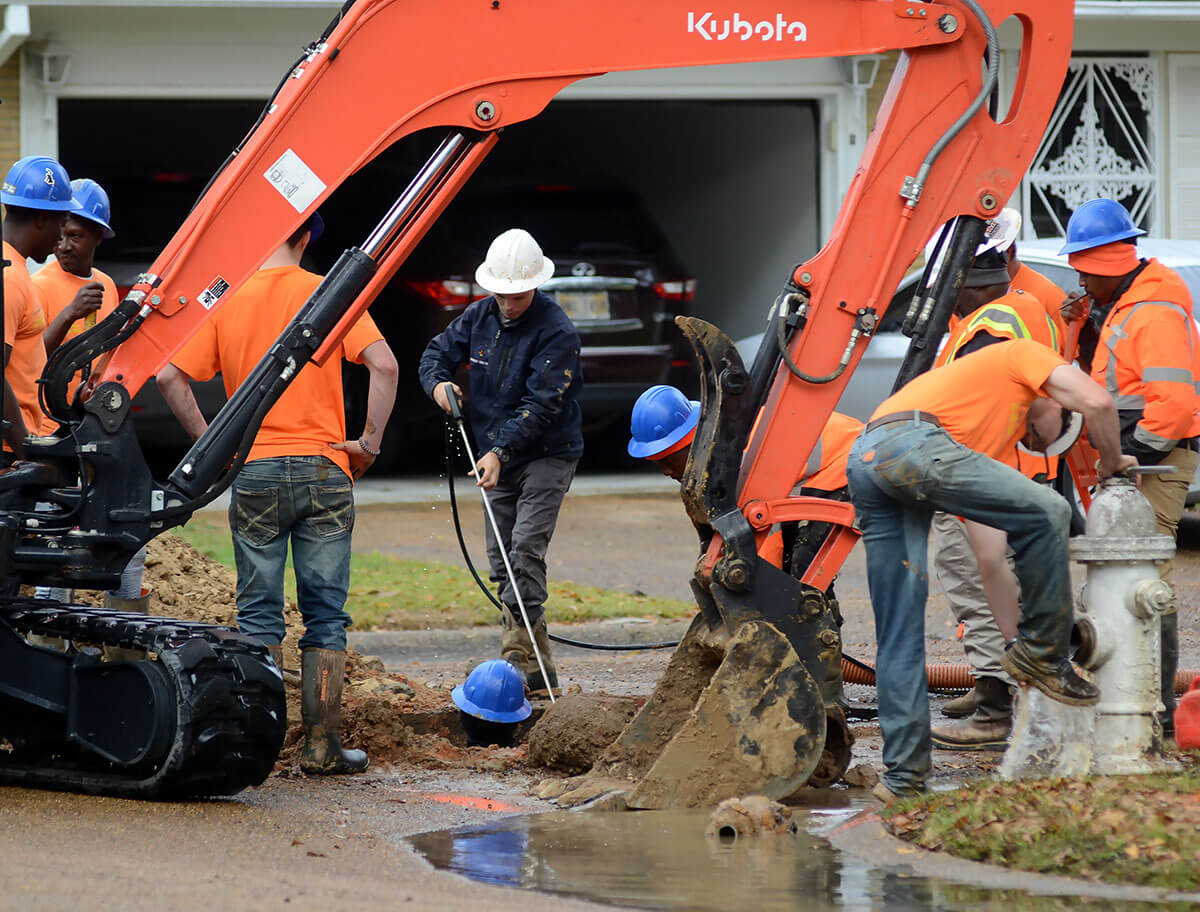

Editor’s note: This essay is part of Mississippi Today Ideas, a platform for thoughtful Mississippians to share fact-based ideas about our state’s past, present and future. You can read more about the section here.
I grew up in Calcutta, now Kolkata, a large city in India. Then, there were parts of Kolkata that smelled of raw sewage. When I came to the United States, I thought I had left that odor behind. And so I had — until I moved with my family to Jackson.
During the first 20-odd years we lived in Jackson, there was always somewhere in my neighborhood I could smell sewage. This indicated there was a leak, even though I couldn’t see it.
Sewage leaks are a health hazard. Contamination of drinking water with sewage can lead to a number of diseases. Further, the kind of mosquitoes that prefer to breed in sewage-contaminated water carry West Nile disease and encephalitis.
Unfixed sewage and water leaks can undermine nearby infrastructure, such as roads and buildings, thereby increasing the ultimate cost of repairs.

When the water and sewage systems were taken over by JXN Water in 2023, there were two sewage leaks near my house. JXN Water has repaired both of them.
For the first time since I moved to Jackson a quarter century ago, I have well-founded confidence that the quality of the water in Jackson is being adequately controlled, and the sewage disposed of properly. This is because these systems are being handled by JXN Water, which was created three years ago expressly to oversee repair and improvement of the city’s water infrastructure.
Less than a year after its creation, JXN Water also was given the job of repairing the failing sewer system, which over the previous three years had leaked 111 million gallons of untreated wastewater into the environment, and discharged 4.5 billion gallons of untreated or under-treated sewage into the Pearl River.
Since JXN Water took control there has been tremendous progress in providing reliable water to the city, and in ensuring that sewage does not leak onto city streets or elsewhere into the environment. However, this progress is now imperiled.
JXN Water is collecting insufficient money from Jackson’s ratepayers to meet operating expenses. JXN Water discovered this financial shortfall only earlier this year. This was not discovered earlier because until the end of 2024 JXN Water had not controlled the sewage and water systems for long enough to properly evaluate the cost of running them.
The federal government did give Jackson between $650 million and $800 million to fix its water woes, but most of this money came with strict conditions: it was to be used for repairing the water system and for projects that brought Jackson’s drinking water supply into compliance with federal standards. Funding the day-to-day operation of the water system was left as the responsibility of the municipality, as it is everywhere else in the country.
Using the federal funds for the sewage system was also excluded. Consequently, JXN Water has to rely on remittances from ratepayers to fund sewage system repairs and operating expenses for both systems.
JXN Water is making every effort to obtain payments for the water it delivers. When JXN Water took control of the water and sewage systems, many ratepayers’ meters were giving erroneous readings.
JXN Water replaced all the meters, but after sending out bills with readings from the new meters, thousands of customers did not submit remittances. After waiting months for payment, JXN Water pursued delinquent accounts and raised the proportion of collections to 70%.
Officials located and resolved over 1,000 unmetered connections and increased monthly revenue about 40%. Unfortunately, their projections indicate that even if they manage to raise collections to 100%, they will not be able to make up their financial shortfall.
JXN Water is not a for-profit company: all the money it collects goes into running Jackson’s water and sewage systems. JXN Water has requested a rate increase corresponding to the amount that would be needed to fund its operations assuming an unrealistically high collection rate of 100%.
This increase was opposed by former Mayor Chokwe Antar Lumumba, the outgoing City Council and Jackson’s present Mayor John Horhn, none of whom have the final say on the rate increase. Most of these officials have declared the increase to be unaffordable for the city’s lower income residents.
The final decision on the rate increase rests with U.S. District Judge Henry Wingate, who oversees the repair of the water and sewer systems. He is considering other options such as legislative interventions and empaneling a Water Authority which could authorize a bond to cover JXN Water’s financial shortfall.
However, legislative measures take time, and a bond is a loan which will have to be repaid, presumably by rate increases borne by JXN Water’s customers. Issuing bonds for ongoing expenses is not a sustainable solution.
Jackson has the unsavory distinction of being the only city of its size in the entire country that does not cover its own water and sewer expenses.
For decades, city government has underinvested in these systems by obscuring the true costs of maintaining them. The present arrangement, which demands separating water and sewer expenses from the other finances of the city, makes the lack of financial support clear to the public.
While Judge Wingate works on options, JXN Water continues its work. It has been short of funds since July. It has resorted to not fully paying contractors who work to fix leaks or the engineering firm that runs the water plant, and promising them payment in the future.
Jackson is financing its water and sewage systems on the goodwill of companies with which it does business. It is unclear how long this goodwill will last.
The only sustainable solution proposed so far to funding Jackson’s water and sewer systems is a rate increase.
City government is abdicating its responsibility to provide safe drinking water for all its residents. It must find another mechanism to support those with low income.
Ranjan Batra retired after serving for 20 years on the faculty of the University of Mississippi Medical Center, and continues to live in Jackson. He recently graduated from Jackson Water Academy, and is now a water ambassador.
- Former Greenwood police officer pleads guilty to federal drug trafficking charges - February 27, 2026
- UMMC officials say normal operations will resume Monday after cyberattack - February 27, 2026
- Hinds County public defender: Office needs additional funding to avert constitutional crisis - February 27, 2026